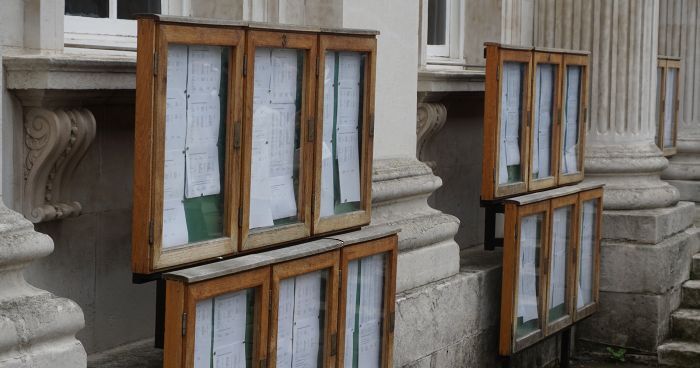‘Good writing is genderless, and university departments should teach that principle’
Lydia Bunt on closing the attainment gap in exams

Last June, Varsity reported on the gender attainment gap in the History Tripos. At Oxford and Cambridge in particular, men more frequently gain the top grades, with women lagging a little behind. It seems bizarre that here, where students are encouraged above all to think for themselves, women are not getting those top grades.
A 2016 report by the Higher Education Policy institute actually reported the reverse of the Cambridge gap, however. It suggested that the underachievement of men in higher education was a ‘national scandal’ and that measures need to be taken to regulate it. What, then, is Cambridge doing wrong?
An academic in my rather female-heavy tripos made a similar point in a revision session in Easter term last year, telling us that, historically, those getting firsts in his paper had been primarily guys, because they’re less likely to ‘sit on the fence’. That provoked not a few eyebrow-raises from the women in the room. It’s difficult, though, to challenge a bare fact, however unwelcome it may be.
“Women only began to trickle through the doors of my own college in 1984”
One of the reasons for this fact is perhaps that we work in a system where academic assertiveness among students is valued more highly than at other British universities. After all, we write several essays a term and have whole hours in which to justify them to our supervisors. This in itself is exciting; it grows the branches of our ideas. However, it’s a system in which lack of female confidence in said ideas is brought to the forefront.
Perhaps another reason for the gap is the fact that Cambridge was founded in an academic era of male dominance, whereas more modern British universities have often accepted both genders since their founding. Women only began to trickle through the doors of my own college in 1984. Obviously, times have since altered, but if Cambridge has a larger gender attainment gap than other institutions, its exclusion of women in history can hardly have helped. Women may find it harder to write their way into the realm of ideas even now, precisely because for so long they have been excluded from it.
“This links to a societal history of the female voice being oppressed”
It is important to emphasise, though, that writing style shouldn’t be gendered. Crafting a ballsy essay isn’t something that men are more capable of than women, and a confident writing style isn’t a ‘male writing style’. Good argumentation in an essay is just a universal principle of successful academic writing. Although jumping to unfounded conclusions is obviously not the way forward, someone who has original ideas and asserts them is always going to do better in an exam than s/he of the tentative pen. This, though, is not a pen that the woman inevitably holds.
If men find it easier to be assertive in their writing, this links to a societal history of the female voice being oppressed, not to any ‘type’ writing style that girls or guys might have. It comes as no great surprise that not all women are as confident in their ideas as men are. However, there is no reason at all why women should not be as academically assertive as men, and plenty of the female academics that surround our day-to-day here in Cambridge prove that. I’ve found that having such role models – women who I can see have opinions, and who believe in them – has been massively helpful for me, in terms of having my own confidence to write my own.
Maybe we can find other solutions to this problem. Obviously, encouraging women to ‘write more like men’ isn’t helpful, or remotely accurate. While raising awareness of the gap is important, its reduction should not be gendered. Inviting participation from women can sometimes really help. I’ve sat in supervisions where the academic (invariably male) will just talk at you for an hour without encouraging you to work out ideas on your own. I know lots of women who would contribute if asked, but perhaps not if there wasn’t an appropriate gap in the conversation for it – myself included. Where confidence lacks, encouragement should be given.
Above all, though, good writing is genderless, and University departments should be teaching us that principle. If women achieve them less, it is not because of some biological propensity to play it safe, but because in the past we have not always been told, or allowed, to speak our minds. Emphasising, to men and women alike, that new arguments are exciting, and that originality is key, is the way to close this gap.
I wasn’t happy when told that guys on my course were likely to get higher grades than me. On second thoughts, though, perhaps that kind of statement sparks and incentivises. Women still need encouragement to act in the genderless sphere of good writing
 News / Clare Hall spent over £500k opposing busway 24 December 2025
News / Clare Hall spent over £500k opposing busway 24 December 2025 Comment / The ‘class’ of Cambridge24 December 2025
Comment / The ‘class’ of Cambridge24 December 2025 News / Caius mourns its tree-mendous loss23 December 2025
News / Caius mourns its tree-mendous loss23 December 2025 Comment / Yes, I’m brown – but I have more important things to say22 December 2025
Comment / Yes, I’m brown – but I have more important things to say22 December 2025 News / Girton JCR publishes open letter expressing solidarity with Palestine25 December 2025
News / Girton JCR publishes open letter expressing solidarity with Palestine25 December 2025










